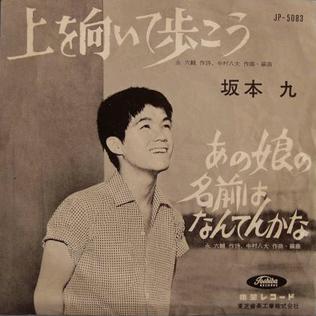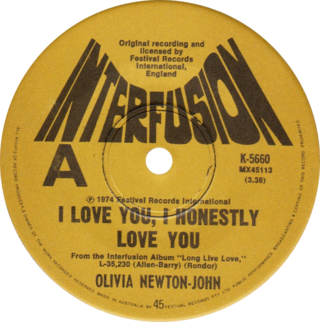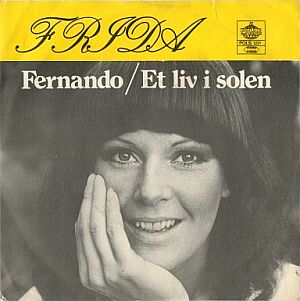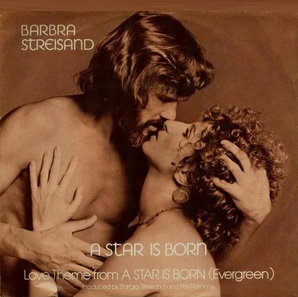Related Research Articles

"Ue o Muite Arukō", alternatively titled "Sukiyaki", is a song by Japanese crooner Kyu Sakamoto, first released in Japan in 1961. The song topped the charts in a number of countries, including the U.S. Billboard Hot 100 in 1963. The song grew to become one of the world's best-selling singles of all time, selling over 13 million copies worldwide.

"I Honestly Love You" is a song recorded by Olivia Newton-John and released in 1974 on the album Long Live Love in the United Kingdom and If You Love Me, Let Me Know in the United States. The song became a worldwide pop hit, her first number-one single in the United States and Canada. The single was first released in Australia as "I Love You, I Honestly Love You", as per its chorus. The song was written by Jeff Barry and Australian singer and composer Peter Allen. The latter recorded it around the same time for his album Continental American.

"Strangers in the Night" is a song composed by Bert Kaempfert with English lyrics by Charles Singleton and Eddie Snyder. Kaempfert originally used it under the title "Beddy Bye" as part of the instrumental score for the movie A Man Could Get Killed. The song was made famous in 1966 by Frank Sinatra.
The Adult Contemporary chart is published weekly by Billboard magazine and lists the most popular songs on adult contemporary radio stations in the United States. The chart is compiled based on airplay data submitted to Billboard by stations that are members of the Adult Contemporary radio panel. The chart debuted in Billboard magazine on July 17, 1961. Over the years, the chart has undergone a series of name changes, being called Easy Listening(1961–1962; 1965–1979), Middle-Road Singles(1962–1964), Pop-Standard Singles(1964–1965), Hot Adult Contemporary(1984–1996) and Adult Contemporary(1979–1984, 1996–present). The current number-one song on the chart is "Lose Control" by Teddy Swims.

"Fernando" is a song written by Benny Andersson and Björn Ulvaeus, from the Swedish musical group ABBA. The song was written for their fellow group member Anni-Frid Lyngstad and was included on her 1975 album Frida ensam.

"Somethin' Stupid", or "Something Stupid", is a song written by C. Carson Parks. It was originally recorded in 1966 by Parks and his wife Gaile Foote, as Carson and Gaile. A 1967 version by Frank Sinatra and his daughter Nancy Sinatra became a major international hit, reaching number one on both the Billboard Hot 100 chart and the UK Singles Chart. In 2001, a cover version by British vocalist Robbie Williams and Australian actress Nicole Kidman reached number one in the UK Singles Chart.

"Daydream Believer" is a song composed by American songwriter John Stewart shortly before he left the Kingston Trio. It was recorded by the Monkees, with Davy Jones singing the lead. The single reached No. 1 on the U.S. Billboard Hot 100 chart in December 1967, remaining there for four weeks, and peaked at No. 5 on the UK Singles Chart. It was the Monkees' third and last No. 1 hit in the U.S.

"Evergreen" is the theme song from the 1976 film A Star Is Born. It was composed and performed by American singer, songwriter, actress and director Barbra Streisand with lyrics by Paul Williams, and arranged by Ian Freebairn-Smith. The song was released on the soundtrack album to A Star Is Born.

"To Sir with Love" is the theme from James Clavell's 1967 film To Sir, with Love. The song was performed by British singer and actress Lulu, and written by Don Black and Mark London. Mickie Most produced the record, with Mike Leander arranging and conducting. The song peaked at the top of the Billboard Hot 100, and became the best-selling single of 1967 in the United States.
"This Town" is a song written by Lee Hazlewood and recorded by Frank Sinatra in 1967. The song was first seen on Sinatra's 1967 album The World We Knew.

"Bad, Bad Leroy Brown" is an uptempo, strophic story song written by American folk rock singer Jim Croce. Released as part of his 1973 album Life and Times, the song was a No. 1 hit for him, spending two weeks at the top of the Billboard Hot 100 in July 1973. Billboard ranked it as the No. 2 song for 1973.
"You're Nobody till Somebody Loves You" is a popular song written by Russ Morgan, Larry Stock, and James Cavanaugh and published in 1944. The song was first recorded by Morgan and was a hit for him in 1946, reaching the No. 14 spot in the charts. The best known version was Dean Martin's, which was released in 1960 and reissued in 1964.
"Winchester Cathedral" is a song by the New Vaudeville Band, a British novelty group established by the song's composer, Geoff Stephens, and was released in late 1966 by Fontana Records.

"Song Sung Blue" is a 1972 hit song written and recorded by Neil Diamond, inspired by the second movement of Mozart's Piano Concerto #21. It was released on Diamond's album Moods, and later appeared on many of Diamond's live and compilation albums. The song was a #1 hit on the Billboard Hot 100 chart in the United States for one week, the week of July 1, and it spent twelve weeks in the Top 40. It also reached #14 on the UK Singles Chart.

"It's Such a Pretty World Today" is a popular song released in 1967, written by songwriter Dale Noe.

"Please Mr. Please" is a song written by Bruce Welch and John Rostill, both members of British pop singer Cliff Richard's backing band, The Shadows. Welch had originally recorded the song himself in 1974 with no commercial success.
"Moon Over Naples" is a 1965 instrumental composed and recorded by German bandleader Bert Kaempfert. The instrumental version reached No. 6 on Billboard's Adult Contemporary chart. It won a BMI Award in 1968.

"Here We Go Again" is a country music standard written by Don Lanier and Red Steagall that first became notable as a rhythm and blues single by Ray Charles from his 1967 album Ray Charles Invites You to Listen. It was produced by Joe Adams for ABC Records/Tangerine Records. To date, this version of the song has been the biggest commercial success, spending twelve consecutive weeks on the US Billboard Hot 100 chart, peaking at number 15.
"My Way Of Life" is a song written by Bert Kaempfert, Herbert Rehbein, and Carl Sigman, appearing in Kaempfert's 1968 album of the same name. The instrumental peaked at #17 on the Billboard Adult Contemporary Chart.
References
- ↑ Whitburn, Joel (2004). The Billboard Book of Top 40 Hits, 8th Edition (Billboard Publications)
- ↑ Hyatt, Wesley (1999). The Billboard Book of #1 Adult Contemporary Hits (Billboard Publications)
- ↑ "French Version Set Of Sinatra 'World'". Billboard . 2 September 1967. Retrieved 30 April 2014.